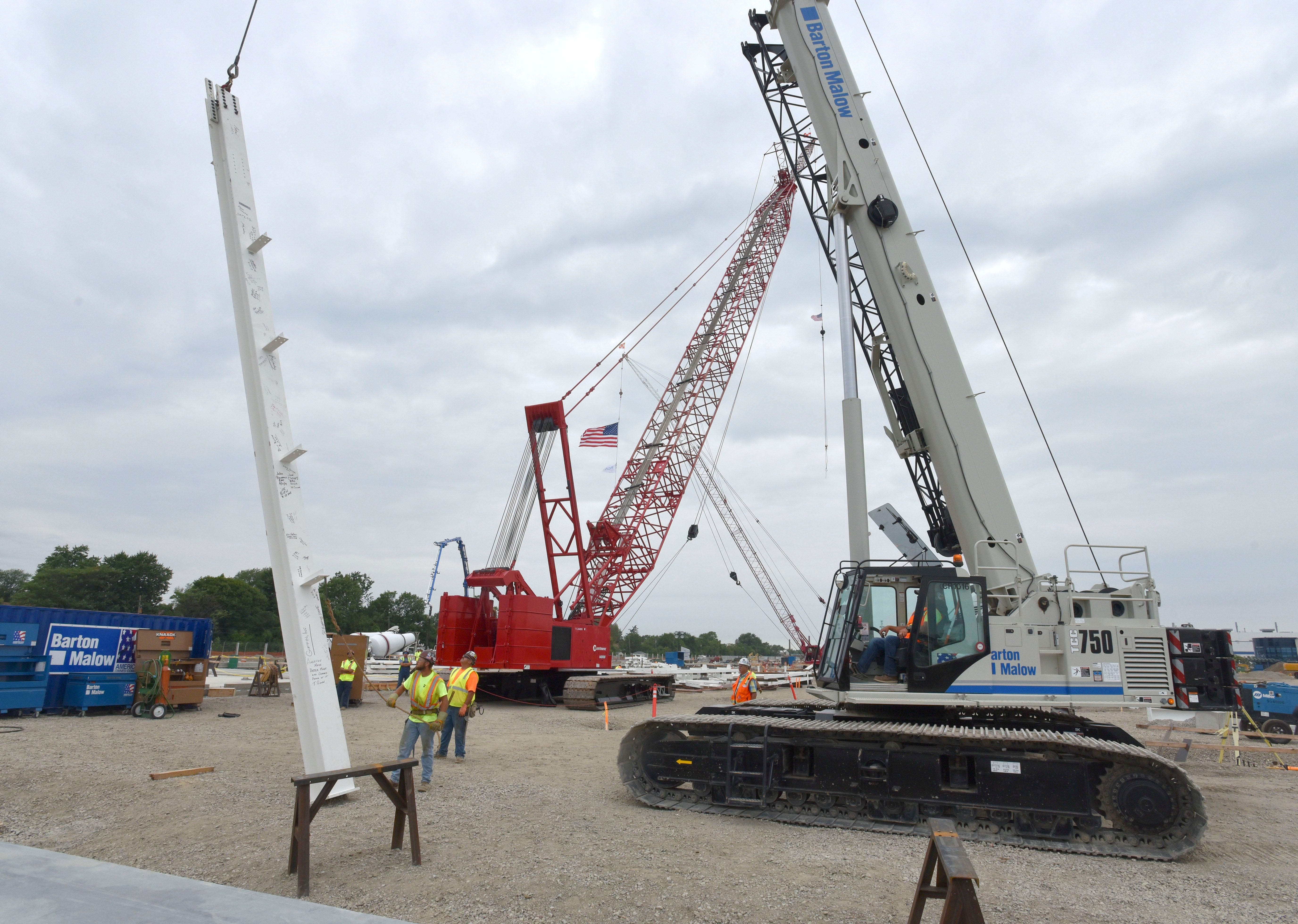'Aggressive' transformation of Fiat Chrysler Mack plant underway
 Breana Noble
Breana Noble
Detroit — A crane lifted the first vertical structural steel column, and workers locked it into place for the new Fiat Chrysler Automobiles paint shop building of the first new assembly plant in the city in nearly three decades.
"It's the first of 299," John Powell, FCA's senior manager of paint facilities, said of the steel column. "We still have a long way to go."
The automaker on Tuesday provided more details on its $1.6 billion transformation of the Mack Avenue Engine Complex on the city's east side into an assembly plant to churn out new three-row, full-size Jeep and next-generation Jeep Grand Cherokee SUVs. Those are key products to create the profits the carmaker needs to invest in its future and offer plug-in hybrids and eventually electric vehicles to meet federal emissions standards.
Construction of the new 790,500-square-foot paint shop is expected to be completed in the first quarter of 2020. Meanwhile, renovations to the long-idled Mack II building are nearly finished to make it plant's body shop, and work is about 10% complete at the Mack I building to become the general assembly plant. Production is expected to begin at the end of 2020.
It's an "aggressive" timeline, Powell said, to meet the company's production goals. The transformation will occur in about 16 months compared to the typical 18 to 20 months for such a project.
"It's helpful to have the already-existing structure," said Eric Goedtel, FCA's senior project manager of its building group. "We need to get it done."
A city ordinance requiring 51% of the project's construction be done by Detroit residents likely will require some contractors to contribute funds to worker training programs to be met, Goedtel said. It's up to contractors to meet the city's standards.
"Some definitely will" have enough Detroit workers, he said, "some won't probably."
Other developments have been challenged to meet city's requirements, as well. An average of 25% of the hours by skilled-trades workers were Detroit residents on Little Caesars Arena, causing dozens of contractors to pay a total of $5.2 million in fines, according to the city's civil rights department.
The FCA project so far totals more than 239,000 construction man-hours with 675 workers across two shifts.
"We've had people working Saturdays and Sundays," Goedtel said. "We even had people working the Fourth of July. (That's how it will be) for the foreseeable future to make sure we can get the equipment installed."
As a part of its community benefits agreement, FCA is giving Detroiters the chance to apply to jobs at the plant a month early. Mayor Mike Duggan said last week he hopes to have 10,000 qualified city residents apply, though the automaker currently is looking to hire 3,850 new jobs at Mack. Another 1,100 is expected to be hired at the adjacent Jefferson North Assembly in the future.
The body shop also will have 10 new truck docks, a new center to check the tolerance of the sheet metals to ensure all the vehicle pieces properly can fit together, and a hiring center. The administrative building's offices also will receive an update and serve as the focal point of the plant as well as its entrance.
The general assembly building will have 30 new truck docks and some office renovations as well as a new test track and quality labs. There also is a new employee parking lot and trailer marshaling area. Covered conveyors will move vehicles between the three buildings.
A sound barrier wall that will range from 10 feet to 18 feet in height along St. Jean also is being built.
The company is aiming for the plant to be a "landfill-free" facility with a 10% reduction in emissions in the region with similar upgrades to FCA's plant in Warren, said Greg Rose, FCA's director of environment, health and safety. The Mack site is expected to produce less than 380 tons of violent organic compound per year. That is about one-third of Jefferson North, Rose said. Mack also will reuse stormwater and have a stormwater park open to the public on vacant lots at Kercheval Avenue and Beniteau Street to support the area's flora and fauna.
"This paint shop we're building here at Mack will have the lowest emission of any full assembly plant in the country," Rose said. "We're very proud of that. We do that by controlling our emissions and being very efficient in the way we operate our paint shop."
Engine production equipment in Mack I and II is being taken to Dundee Engine Plant to activate the vacant half of the plant there. Some workers from the Mack plant already have transferred there.
The new paint shop at the Mack site will sit on the land where the original stamping plant Michigan Stamping Co. built here in 1916. Chrysler Corp. eventually acquired the site from Briggs Manufacturing in 1953. The complex previously built the Dodge Viper and Pentastar V6 engines. Mack II has been idled since 2012.
The Mack expansion is part of a $4.5 billion investment into five of the automaker's Michigan plants. It includes a $900 million investment into Jefferson North. The Michigan Strategic Fund granted FCA an incentive package totaling $223 million to offset the cost of the Mack expansion and modernize efforts at Jefferson North. And the state provided the city of Detroit another $93 million to offset costs associated with site preparation.
bnoble@detroitnews.com